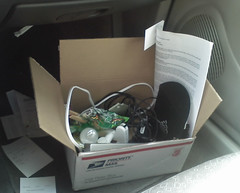 A good credit score opens doors. Nearly every aspect of your life depends on your credit score. Banks, Insurance Companies and Credit Card Companies give you deals based on your credit scores. A good credit score is achieved only if you are appropriately managing your debt. Managing your finances is key so that you are always seen as creditworthy is the best way to keep FICO scores high and debt away.
A good credit score opens doors. Nearly every aspect of your life depends on your credit score. Banks, Insurance Companies and Credit Card Companies give you deals based on your credit scores. A good credit score is achieved only if you are appropriately managing your debt. Managing your finances is key so that you are always seen as creditworthy is the best way to keep FICO scores high and debt away.
The first method of maximizing credit and eliminating debt is to stop buying on credit and credit cards should be reserved only for emergencies. The more cash you pay the less you will spend on unnecessary temptations which minimizes costly credit based financing.
If you do need a credit card try and find a credit card that has a low APR or annual percentage rate and spend 30% less that your limit through credit cards. Maintaining a balance of less than 30% while maintaining on-time payment increases your score. Dispute any doubtful charge by the Credit Card Company or financial institution immediately and ignoring this will only complicate the matter. Start paying bills on time and make a resolution not to pay a late fee for one year for starters and keep renewing the resolution and remove debt from your life.
Periodically get a credit report from a credit reporting agency to check if you can eliminate any of the debts reported or if any dubious debt has been recorded. Always have a budget in place. A budget gives you financial direction as you navigate through the maze of consumer temptations. Deviating from the budget will only increase your debt. Maintain a daily household account and make sure that every single dollar you spend is recorded. You should make sure that your account never shows excessive expenditure.
Debt is not a dead end. Debt management is a tunnel through which you can go and the light at the end of the tunnel is your freedom from debt.

 According to Slate Magazine and the financial times, Chinese hackers have breached White House computers and there is speculation that this was a Chinese government sponsored event. Individuals or groups with enough skill, time and resources to crack government systems are a definite threat to the average person.
According to Slate Magazine and the financial times, Chinese hackers have breached White House computers and there is speculation that this was a Chinese government sponsored event. Individuals or groups with enough skill, time and resources to crack government systems are a definite threat to the average person.  Losing your job is the most devastating thing that can happen to you next to the death of a loved one or divorce. Losing a job shatters your financial world till you get another job. There are many avenues to explore to remain financially stable even if you lose your job.
Losing your job is the most devastating thing that can happen to you next to the death of a loved one or divorce. Losing a job shatters your financial world till you get another job. There are many avenues to explore to remain financially stable even if you lose your job.  You can manage your debts by yourself or get professional help. Debts can overwhelm you and getting out of debt can seem like an unending process. Good financial management is all it takes to help you get out of any type of debt trap systematically. Discipline is the fundamental attribute for getting out of any situation including debt. Making a disciplined effort to save and repay debts by cutting your own expenditure till you get out of debt will keep debts away forever.
You can manage your debts by yourself or get professional help. Debts can overwhelm you and getting out of debt can seem like an unending process. Good financial management is all it takes to help you get out of any type of debt trap systematically. Discipline is the fundamental attribute for getting out of any situation including debt. Making a disciplined effort to save and repay debts by cutting your own expenditure till you get out of debt will keep debts away forever. 

